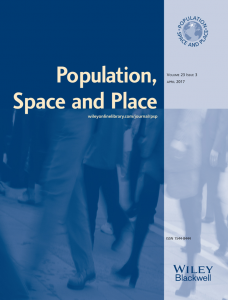Sociology of Cancer: A Decade of Research

Our recent review article, which is free to read in the journal Sociology of Health & Illness reviewed sociological research on cancer over the last decade to identify the contribution of sociology to cancer research and care.
The largest proportion of articles focused on living with and beyond cancer. This research showed how cancer can be disruptive, prompting changes in people’s sense of who they are. However, people have a range of experiences which do not fit neatly into common depictions of people ‘fighting’ cancer or being a cancer ‘survivor’. Sociologists have also explored how people experience cancer care, highlighting the best ways to support a diversity of patients, including recognising and supporting the ‘work’ of being a cancer patient (e.g, learning about cancer, making decisions, supporting others).
Risk and responsibilities for cancer was another important theme, particularly in relation to cancer screening. A lot of this work looked at how people’s understandings of cancer risk vary depending on their backgrounds, helping to explain different levels of screening uptake and delays in diagnosis. Other authors explored the emphasis on the responsibilities of individuals for preventing cancer through their own behavior in popular media and screening policies. The importance of addressing environmental and social elements of cancer risk management, including cultural and language barriers to screening was also stressed.
A third set of literatures explored how cancer research and care has changed in recent years. This work traced the rise of ‘evidence-based’ medicine and the increasing level of collaboration, including via international associations and partnerships with pharmaceutical companies. The growing role of patients in shaping research and regulation was also covered, especially in relation to the tensions around how and when patients are involved, and what kinds of voices are included.
This review suggests that, although biomedicine has advanced apace over the last decade, it is not the sole or even the main driver of improvement in how cancer is experienced or care is provided. Patients’ expectations and involvement have blossomed and transformed over this period, changing their experiences of cancer and its risk. Biomedicine also brings with it many questions, not just answers, for patients and providers alike. Sociologists have played an important role in documenting a diversity of experiences and dilemmas that arise from these developments, challenging stereotypes of the typical cancer patient or person coming forward for screening. All this helps to improve services to cater for people’s diverse needs. Our review also suggests that sociological analysis could extend to include a wider range of experiences and perspectives, given that much of it is focused on North America and Europe, particularly white European women’s experiences.
Kerr, A. , Ross, E. , Jacques, G. and Cunningham‐Burley, S. (2018), The sociology of cancer: a decade of research. Sociol Health Illn, 40: 552-576. doi: 10.1111/1467-9566.12662
Anne Kerr is Professor of Sociology and Director of the Centre for Health Technologies and Social Practice in the School of Sociology and Social Policy at the University of Leeds where she researches and teaches on medicine, science and health.
Sarah Cunningham-Burley is Professor of Medical and Family Sociology and Dean of Molecular, Genetic and Population Health Sciences, Edinburgh Medical School, and Director of a new Centre for Biomedicine, Self and Society, which is supported by a Wellcome Trust Discretionary Award, at the University of Edinburgh. She researches and teaches in a multi-disciplinary environment, bringing social scientific perspectives and methods to understanding and practice in medicine, public health and health policy.
Sarah and Anne currently hold a Wellcome Trust Senior Investigator Award, ‘Transformations and Translations in Patienthood: cancer in the post-genomic era’.
Emily Ross is a medical sociologist at the University of Edinburgh, and Research Fellow on the Wellcome Trust funded study ‘Transformations and Translations in Patienthood: cancer in the post-genomic era’. She researches experiences of health and illness with particular interests in diagnosis, uncertainty and engagement with medical technologies.





1540-6210/asset/society_affiliation_image.gif?v=1&s=812a48e1b22880cc84f94f210b57b44da3ec16f9)
